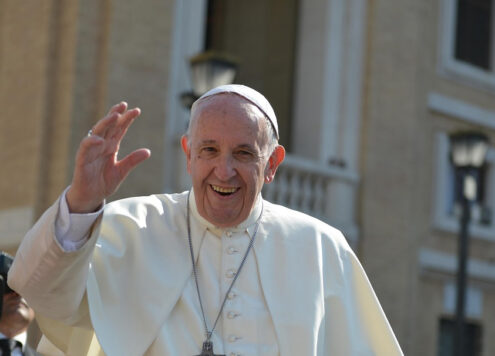Epiphany—what does it mean? At its heart, the word signifies revelation or manifestation. In everyday language, when we experience an epiphany, we encounter a profound moment of clarity, a sudden realization that uncovers something previously hidden. Nature often offers such moments: the breathtaking dance of the Aurora Borealis, for instance, reveals the intricate interplay of cosmic forces we scarcely comprehend. These natural “epiphanies” put us in touch with the beauty and mystery woven into creation.
But the Feast of the Epiphany invites us into a deeper, more transformative revelation. Often referred to as “Little Christmas,” this epiphany transcends the mere celebration of a single event: Christmas, to a personal experience of it. We realize how Christ’s light manifests in our lives and empowers us to share that light with others. The Epiphany is about personal transformation—a spiritual awakening that draws us closer to God and challenges us to shine His light in our daily lives, even when the path ahead is uncertain.
The story of the Epiphany centers on the journey of the Magi, the Wise Men who followed a mysterious star to Bethlehem. Their story is one of openness to divine intervention, of being guided by an inner light and a profound trust in God’s purpose. These men from distant lands recognized in the Christ Child a King whose reign extended beyond borders and cultures, and their gifts—gold, frankincense, and myrrh—symbolize the richness of faith, worship, and sacrifice.
The Gospel of Matthew uses this story to highlight a startling truth: while the religious elite failed to recognize the Messiah, outsiders welcomed Him with open hearts. This message or manifestation recurs throughout Scripture, including in the life of the Apostle Paul, who experienced his own epiphany, becoming a tireless advocate for bringing the Gospel to the Gentiles. God’s ways often defy human expectations, using even the most unlikely circumstances and people to reveal His glory.
Epiphanies aren’t confined to ancient stories or grand events. They happen here and now, in the ordinary moments of our lives. They occur when we pause to truly appreciate the world around us—with all its beauty and pain—and recognize God’s hand at work. The only time that truly belongs to us is the present moment. It’s in this “now” that we are called to experience our own epiphanies: to see God in the mundane, to be surprised by His grace, and to find joy in the unexpected.
Modern life tends to point our focus to the future, urging us to plan, prepare, and produce. While this kind of forward-thinking has its place, the message of the Epiphany invites us to center ourselves in the present. To live fully in the moment is to open our hearts to the revelations God has for us today. It’s a reminder that life’s most profound truths are to found, not in grand gestures but in small acts of kindness, compassion, and love.
As mentioned, Christian tradition refers to the Epiphany as “Little Christmas.” Why? Because it reflects the simple yet profound act of welcoming the good news of Christ into our lives. The gospel is not static. It is a dynamic force meant to illuminate our paths and radiate through the way we live. When the Gospel shines through us, it becomes a manifestation—a revelation of God’s presence in our lives. A kind word, a visit to a sick friend, or simply being present for someone in need can become an epiphany for them—a moment when God’s love shines through actions. Such moments may seem small, but their impact is immeasurable.
I’m reminded of a story about a little girl and her mother leaving church. The girl, full of curiosity, asked her mother, “Is it true what the preacher said—that God is love?”
“Yes, darling,” the mother replied.
“And is it true that God is within us?” the girl continued.
Again, the mother affirmed, “Yes, the Kingdom of God is within you.”
The little girl paused thoughtfully before exclaiming, “If God is love, and if He’s within us, shouldn’t He shine through?”
Such wisdom from a child captures the essence of the Epiphany: the light of Christ is meant to radiate from within us, touching everyone we meet.
As the feast of the Epiphany coincides with the New Year, let us resolve to recommit to the good news of the Gospel, bringing the light of Christ to others through simple acts of love and kindness. These are everyday actions that hold the power to inspire, reveal, and manifest hope and healing.
Happy New Year, and may your Epiphany be joy-filled and transformative.
—Fr. Hugh Duffy, Ph.D.











4 Comments
Tom Walsh
Beautiful explanation of the Epiphany Fr. Hugh and very much appreciated. What strikes a cord with me in it, is the paragraph about living in the now and where our daily lives are focused on the future. I find it difficult to live in the now, because I have committed myself to things in the future. So I do what I have to do now, but always think about what I have yet to do, in case I may forget.
Hugh Duffy
You’re not alone in being tempted to focus on the future, Tom. Our whole economy is focused on the future, it seems, creating bubbles ready to burst. Have you noticed that big oligarchs are selling their stocks?
You’re better off focusing on the present from a spiritual point of view, certainly.
Bartholomew Okere
Fr. Duffy,you really simplified the Feast of Epiphany to the point that every Christian can u/stand. Loved the story of the little girl & her mom, esp talking about the love of God who shines through in every phase of our endeavor. Am tempted to live the life of the moment becoz tomorrow is unpredictable. Epiphany as you highlighted is for me a Little Christmas.Thx for your exegesis on this Feast
Tom Rooney
Thank you father Hugh ,happy and healthy newyear to you and yours